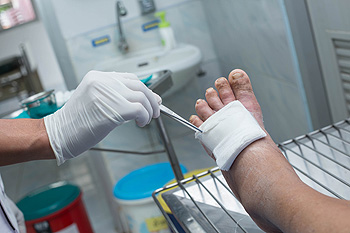NJ (908) 688-5577
NY (212) 737-2528

Heel pain is often caused by plantar fasciitis or a heel spur. Plantar fasciitis is the inflammation of the thick band of tissue that runs along the bottom of the foot and connects the heel bone to the toes. This condition usually causes sharp pain in the heel, especially during the first steps in the morning or after long periods of standing. A heel spur is a bony growth that can develop on the underside of the heel bone, often resulting from chronic strain on foot muscles and ligaments. Although heel spurs may not always cause pain, when they do, the discomfort can feel similar to plantar fasciitis. If you have heel pain, it is strongly suggested that you consult a podiatrist who can offer effective relief tips for heel spurs and plantar fasciitis.
Many people suffer from bouts of heel pain. For more information, contact Glenn Davison, DPM of Advanced Podiatry. Our doctor can provide the care you need to keep you pain-free and on your feet.
Causes of Heel Pain
Heel pain is often associated with plantar fasciitis. The plantar fascia is a band of tissues that extends along the bottom of the foot. A rip or tear in this ligament can cause inflammation of the tissue.
Achilles tendonitis is another cause of heel pain. Inflammation of the Achilles tendon will cause pain from fractures and muscle tearing. Lack of flexibility is also another symptom.
Heel spurs are another cause of pain. When the tissues of the plantar fascia undergo a great deal of stress, it can lead to ligament separation from the heel bone, causing heel spurs.
Why Might Heel Pain Occur?
Treatments
Heel pain should be treated as soon as possible for immediate results. Keeping your feet in a stress-free environment will help. If you suffer from Achilles tendonitis or plantar fasciitis, applying ice will reduce the swelling. Stretching before an exercise like running will help the muscles. Using all these tips will help make heel pain a condition of the past.
If you have any questions please contact our offices located in Union, NJ and New York . We offer the newest diagnostic and treatment technologies for all your foot and ankle needs.

Diabetic foot ulcers are open wounds that develop on the feet, toes, or ankles due to reduced blood flow and nerve damage caused by diabetes. Diabetic foot ulcers are often painless, which means patients may not realize they have one until it becomes infected. Infections can spread quickly into deeper tissue, increasing the risk of bone involvement or even sepsis. Poor circulation slows the healing process, making these ulcers harder to treat. A podiatrist can help by assessing the severity of the ulcer, cleaning the wound, and applying protective dressings to reduce infection risk. In some cases, patients may need pressure-relieving footwear, a cast, or surgery to remove damaged tissue. Infected ulcers often require antibiotics, and severe infections may need hospital care. Regular foot care is important to avoid complications from diabetic foot ulcers. If you have foot ulcers as a result of diabetes, it is suggested that you are under the care of a podiatrist for ongoing treatment.
Diabetic foot care is important in preventing foot ailments such as ulcers. If you are suffering from diabetes or have any other concerns about your feet, contact Glenn Davison, DPM from Advanced Podiatry. Our doctor can provide the care you need to keep you pain-free and on your feet.
Diabetic Foot Care
Diabetes affects millions of people every year. The condition can damage blood vessels in many parts of the body, especially the feet. Because of this, taking care of your feet is essential if you have diabetes, and having a podiatrist help monitor your foot health is highly recommended.
The Importance of Caring for Your Feet
Patients with diabetes should have their doctor monitor their blood levels, as blood sugar levels play such a huge role in diabetic care. Monitoring these levels on a regular basis is highly advised.
It is always best to inform your healthcare professional of any concerns you may have regarding your feet, especially for diabetic patients. Early treatment and routine foot examinations are keys to maintaining proper health, especially because severe complications can arise if proper treatment is not applied.
If you have any questions please feel free to contact our offices located in Union, NJ and New York . We offer the newest diagnostic and treatment technologies for all your foot and ankle needs.

Outer foot pain while running can disrupt performance and indicate underlying foot issues. Several causes may contribute to this discomfort. Blisters, often caused by friction or ill-fitting shoes, can create surface pain along the foot's outer edge. Bunions, although typically near the big toe, can alter foot mechanics and lead to lateral discomfort. Flat feet may cause instability, placing strain on the outer foot, while high arches can lead to poor shock absorption and excessive pressure on that same area. Another possible cause is Morton’s neuroma, a painful condition involving nerve irritation usually felt in the forefoot but occasionally radiating outward. If you enjoy running and have developed foot pain, it is suggested that you contact a podiatrist who can provide an accurate diagnosis and treatment.
Foot Pain
Foot pain can be extremely painful and debilitating. If you have a foot pain, consult with Glenn Davison, DPM from Advanced Podiatry. Our doctor will assess your condition and provide you with quality foot and ankle treatment.
Causes
Foot pain is a very broad condition that could be caused by one or more ailments. The most common include:
Diagnosis
To figure out the cause of foot pain, podiatrists utilize several different methods. This can range from simple visual inspections and sensation tests to X-rays and MRI scans. Prior medical history, family medical history, and any recent physical traumatic events will all be taken into consideration for a proper diagnosis.
Treatment
Treatment depends upon the cause of the foot pain. Whether it is resting, staying off the foot, or having surgery; podiatrists have a number of treatment options available for foot pain.
If you have any questions, please feel free to contact our offices located in Union, NJ and New York . We offer the newest diagnostic and treatment technologies for all your foot care needs.